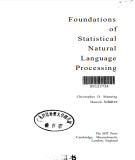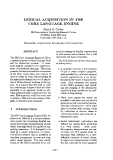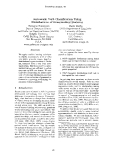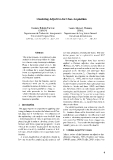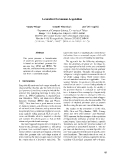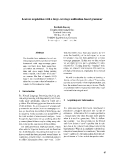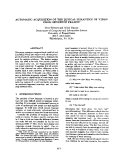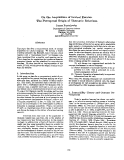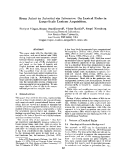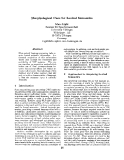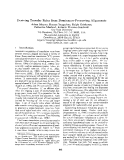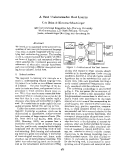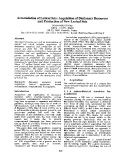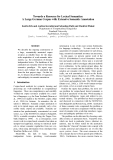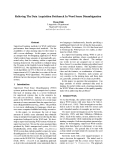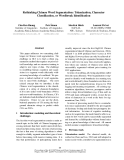
Lexical acquisition
-
Ebook "Foundations of statistical natural language processing" includes content: Lexical acquisition, introduction, mathematical foundations, linguistic essentials, corpus based work, collocations, statistical inference - n gram models over sparse data, word sense disambiguation,.... and other contents.
 704p
704p  haojiubujain07
haojiubujain07
 20-09-2023
20-09-2023
 6
6
 2
2
 Download
Download
-
Vocabulary acquisition is central to language learning and of great importance to the English Language Learners. Many learners face difficulty in correctly selecting words to deliver their ideas due to their insufficient lexical knowledge. This work aims to analyze the significance of sense relations instruction in vocabulary teaching.
 9p
9p  vicross2711
vicross2711
 20-06-2019
20-06-2019
 103
103
 11
11
 Download
Download
-
The lexicons for Knowledge-Based Machine Translation systems require knowledge intensive morphological, syntactic and semantic information. This information is often used in different ways and usually formatted for a specific NLP system. This tends to make both the acquisition and maintenance of lexical databases cumbersome, inefficient and error-prone. In order to solve these problems, we have developed a program called COOL which automates the acquisition and maintenance processes and allows us to standardize and centralize the databases. ...
 9p
9p  buncha_1
buncha_1
 08-05-2013
08-05-2013
 53
53
 2
2
 Download
Download
-
The SRI Core Language Engine (CLE) is a general-purpose natural language front end for interactive systems. It translates English expressions into representations of their literal meanings. This paper presents the lexical acquisition component of the CLE, which allows the creation of lexicon entries by users with knowledge of the application domain but not of linguistics or of the detailed workings of the system. It is argued that the need to cater for a wide range of types of back end leads naturally to an approach based on eliciting grammaticality judgments from the user.
 8p
8p  buncha_1
buncha_1
 08-05-2013
08-05-2013
 47
47
 2
2
 Download
Download
-
We apply machine learning techniques to classify automatically a set of verbs into lexical semantic classes, based on distributional approximations of diatheses, extracted from a very large annotated corpus. Distributions of four grammatical features are sufficient to reduce error rate by 50% over chance. We conclude that corpus data is a usable repository of verb class information, and that corpus-driven extraction of grammatical features is a promising methodology for automatic lexical acquisition. ...
 8p
8p  bunthai_1
bunthai_1
 06-05-2013
06-05-2013
 45
45
 3
3
 Download
Download
-
This paper presents an exploratory data analysis in lexical acquisition for adjective classes using clustering techniques. From a theoretical point of view, this approach provides large-scale empirical evidence for a sound classification. From a computational point of view, it helps develop a reliable automatic subclassification method. Results show that the features used in theoretical work can be successfully modelled in terms of shallow cues.
 8p
8p  bunthai_1
bunthai_1
 06-05-2013
06-05-2013
 50
50
 1
1
 Download
Download
-
This paper presents a formalization of automatic grammar acquisition that is based on lexicalized grammar formalisms (e.g. LTAG and HPSG). We state the conditions for the consistent acquisition of a unique lexicalized grammar from an annotated corpus. idea in this study is to automatically obtain the lexical entries from an annotated corpus, which will greatly reduce the cost of building the grammar.
 4p
4p  bunthai_1
bunthai_1
 06-05-2013
06-05-2013
 35
35
 2
2
 Download
Download
-
We describe how unknown lexical entries are processed in a unification-based framework with large-coverage grammars and how from their usage lexical entries are extracted. To keep the time and space usage during parsing within bounds, information from external sources like Part of Speech (PoS) taggers and morphological analysers is taken into account when information is constructed for unknown words.
 4p
4p  bunthai_1
bunthai_1
 06-05-2013
06-05-2013
 40
40
 2
2
 Download
Download
-
This paper presents a computational model of verb acquisition which uses what we will callthe principle of structured overeommitment to eliminate the need for negative evidence. The learner escapes from the need to be told that certain possibilities cannot occur (i.e.,are "ungrammatical") by one simple expedient: It assumes that all properties it has observed are either obligatory or forbidden until it sees otherwise, at which point it decides that what it thought was either obligatory or forbidden is merely optional.
 8p
8p  bungio_1
bungio_1
 03-05-2013
03-05-2013
 45
45
 1
1
 Download
Download
-
This paper describes a computational model of concept acquisition for natural language. W e develop a theory of lexical semantics, the Eztended Aspect Calculus, which together with a ~maxkedness theory" for thematic relations, constrains what a possible word meaning can be. This is based on the supposition that predicates from the perceptual domain axe the primitives for more abstract relations. W e then describe an implementation of this model, TULLY, which mirrors the stages of lexical acquisition for children. ...
 7p
7p  bungio_1
bungio_1
 03-05-2013
03-05-2013
 39
39
 1
1
 Download
Download
-
INKA is a natural language interface to facilitate knowledge acquisition during expert system development for electronic instrument trouble-thooting. The expert system design methodology develops a domain definition, called GLIB, in the form of a semantic grammar. This grammar format enables GLIB to be used with the INGLISH interface, which constrains users to create statements within a subset of English. Incremental patting in INGLISH allows immediate remedial information to be generated if a user deviates from the sublanguage.
 8p
8p  bungio_1
bungio_1
 03-05-2013
03-05-2013
 61
61
 1
1
 Download
Download
-
This paper deals with the discovery, representation, and use of lexical rules (LRs) during large-scale semi-automatic computational lexicon acquisition. The analysis is based on a set of LRs implemented and tested on the basis of Spanish and English business- and finance-related corpora. We show that, though the use of LRs is justified, they do not come costfree. Semi-automatic output checking is required, even with blocking and preemtion procedures built in.
 8p
8p  bunmoc_1
bunmoc_1
 20-04-2013
20-04-2013
 27
27
 2
2
 Download
Download
-
Most natural language processing tasks require lexical semantic information. Automated acquisition of this information would thus increase the robustness and portability of NLP systems. This paper describes an acquisition method which makes use of fixed correspondences between derivational affixes and lexical semantic information. One advantage of this method, and of other methods that rely only on surface characteristics of language, is that the necessary input is currently available.
 7p
7p  bunmoc_1
bunmoc_1
 20-04-2013
20-04-2013
 40
40
 2
2
 Download
Download
-
Automatic acquisition of translation rules from parallel sentence-aligned text takes a variety of forms. Some machine translation (MT) systems treat aligned sentences as unstructured word sequences. Other systems, including our own ((Grishman, 1994) and (Meyers et al., 1996)), syntactically analyze sentences (parse) before acquiring transfer rules (cf. (Kaji et hi., 1992), (Matsumoto et hi., 1993), and (Kitamura and Matsumoto, 1995)). This has the advantage of acquiring structural as well as lexical correspondences. ...
 5p
5p  bunrieu_1
bunrieu_1
 18-04-2013
18-04-2013
 54
54
 2
2
 Download
Download
-
We introduce an approach to the automatic acquisition of new concepts fi'om natural language texts which is tightly integrated with the underlying text understanding process. The learning model is centered around the 'quality' of different forms of linguistic and conceptual evidence which underlies the incremental generation and refinement of alternative concept hypotheses, each one capturing a different conceptual reading for an unknown lexical item.
 7p
7p  bunrieu_1
bunrieu_1
 18-04-2013
18-04-2013
 38
38
 3
3
 Download
Download
-
This paper presents our work on accumulation o f lexical sets which includes acquisition o f dictionary resources and production o f new lexical sets from this. The method for the acquisition, using a context-free syntax-directed translator and text modification techniques, proves easy-to-use, flexible, and efficient. Categories of production are analyzed, and basic operations are proposed which make up a formalism for specifying and doing production.
 5p
5p  bunrieu_1
bunrieu_1
 18-04-2013
18-04-2013
 60
60
 2
2
 Download
Download
-
We describe the ongoing construction of a large, semantically annotated corpus resource as reliable basis for the largescale acquisition of word-semantic information, e.g. the construction of domainindependent lexica. The backbone of the annotation are semantic roles in the frame semantics paradigm. We report experiences and evaluate the annotated data from the first project stage. On this basis, we discuss the problems of vagueness and ambiguity in semantic annotation.
 8p
8p  bunbo_1
bunbo_1
 17-04-2013
17-04-2013
 42
42
 2
2
 Download
Download
-
Supervised learning methods for WSD yield better performance than unsupervised methods. Yet the availability of clean training data for the former is still a severe challenge. In this paper, we present an unsupervised bootstrapping approach for WSD which exploits huge amounts of automatically generated noisy data for training within a supervised learning framework. The method is evaluated using the 29 nouns in the English Lexical Sample task of SENSEVAL2.
 8p
8p  bunbo_1
bunbo_1
 17-04-2013
17-04-2013
 38
38
 1
1
 Download
Download
-
The EM clustering algorithm (Hofmann and Puzicha, 1998) used here is an unsupervised machine learning algorithm that has been applied in many NLP tasks, such as inducing a semantically labeled lexicon and determining lexical choice in machine translation (Rooth et al., 1998), automatic acquisition of verb semantic classes (Schulte im Walde, 2000) and automatic semantic labeling (Gildea and Jurafsky, 2002).
 8p
8p  bunbo_1
bunbo_1
 17-04-2013
17-04-2013
 42
42
 1
1
 Download
Download
-
This paper addresses two remaining challenges in Chinese word segmentation. The challenge in HLT is to find a robust segmentation method that requires no prior lexical knowledge and no extensive training to adapt to new types of data. The challenge in modelling human cognition and acquisition it to segment words efficiently without using knowledge of wordhood. We propose a radical method of word segmentation to meet both challenges.
 4p
4p  hongvang_1
hongvang_1
 16-04-2013
16-04-2013
 46
46
 2
2
 Download
Download
CHỦ ĐỀ BẠN MUỐN TÌM









